How To Treat And Prevent Fleas In Puppies?

Table of Contents
Listen To The Article
Introduction to How To Treat And Prevent Fleas In Puppies?
Fleas are a common problem for puppies. It is important to treat them for fleas regularly, as fleas can be a big problem for small dogs.
A flea infestation can cause itching and irritation for the animal and can be a potential carrier of tapeworms.
The best method of ensuring your puppy is free of fleas is to use a preventative, as well as to treat the area they live in.
There are a variety of preventative methods, which can be found at most pet stores.
Maybe you just got a new puppy, or you find that your dog has fleas despite having the typical flea control treatments.
No matter the circumstance, fleas are a serious nuisance for dogs.
They can cause skin irritation, and in extreme cases, even tapeworms and other intestinal parasites.
To top it off, they are also gross.
Fleas are tiny parasites that feed on the blood of animals and humans.
Fleas are most common on dogs, but flea infestations can also occur on cats and other animals.
Having a flea-infested dog is a big problem, but it is also a health risk to you and your family as well.
Nowadays, it has become more difficult to treat flea infestations because of the increasing popularity of flea prevention products that are considered to be “environmentally safe”.
Dogs with sensitive skin are also more susceptible to fleas.
Luckily, there are a few things you can do to help your dog recover, and avoid getting fleas again.
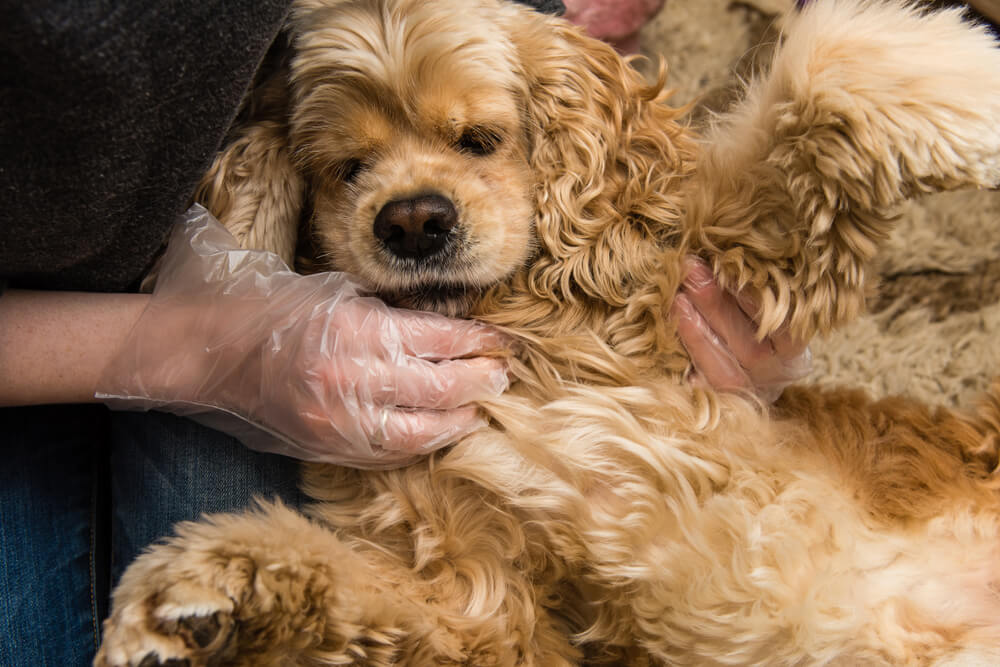
Finding Fleas On Puppies
Spotting fleas early is important in keeping your puppy safe and preventing a full-blown infestation.
A flea comb will help you find the fleas themselves, as well as any debris they leave behind. While you’re grooming your pup, look for symptoms of fleabite dermatitis.
This occurs when a dog is allergic to flea saliva.
Puppies with fleabite dermatitis will scratch excessively and may develop red, irritated, and infected patches of skin called hot spots.
More extreme symptoms of a flea infestation can include weight loss, pale gums, and lethargy Checking your dog up to three times per day for flea activity.
If you suspect your puppy has a flea problem, or if she exhibits any concerning symptoms, take her to the veterinarian right away because dogs spend so much time outdoors, ticks are a common problem and a big concern for owners.
If left untreated, fleas and ticks can become a serious nuisance and potential health problem for your dog.
Ticks feed on the blood of the host and use tiny but sharp teeth to embed themselves firmly into a dog’s skin and tissue because they penetrate into the bloodstream, ticks can also spread blood-borne illnesses.
The larvae and nymph stage of the tick are very small and can easily be missed.
The adult tick is about 3mm and is visible to most.
The larvae and nymph are about half that size and difficult to identify.
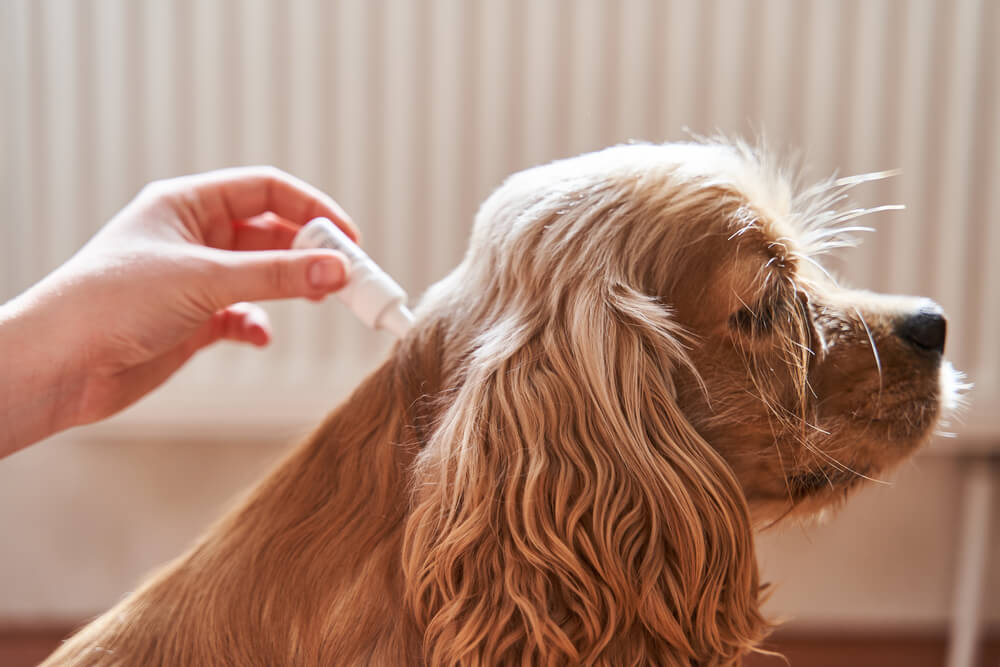
What to Do If Your Puppy or Dog Has Fleas?
Fleas can cause a lot of problems for your puppy, not only do they prevent your dog from getting a good night’s sleep, but they can also cause irritation and rashes.
And if your dog has a flea allergy, it can even lead to a serious or even fatal allergic reaction.
If you think your puppy or dog has fleas, think again and read on to see what to do.
Flea treatment:
Oral Flea Treatment is safe to give to puppies as young as four weeks old (and a minimum of 2 pounds).
This medication is given in a tablet form to treat flea infestations because its active ingredient (nitenpyram) works for only 24 hours, it is not effective as a preventive medication.
Always speak to your veterinarian before offering your puppy or dog a new medication to ensure it is safe for your dog to take and to confirm dosage.
Flea shampoos & collars:
Most veterinarians do not recommend flea shampoos or collars for puppies or adult dogs because they are not very effective.
Flea comb:
As an alternative to medications (or for pups younger than four weeks),
Using a flea comb to check your puppy for the presence of fleas and safely remove them.
Clean the home:
Depending on the severity of the infestation, it may be necessary to also treat your home to ensure flea eggs and larvae don’t grow to reinfest your puppy later.
Of the flea population, only 5 percent includes adult fleas on pets.
The rest are in various stages of the life cycle and can be found outdoors or in your home.
Vacuum your carpets (remember to remove the bag afterward) and clean all bedding your pet has used as well as any chairs with padding.
Speak to your veterinarian about what additional steps you should take to treat the problem and prevent it from returning.

Different Types Of Flea And Tick
Treatments For Dogs
Medicated shampoos can be very helpful in treating the secondary skin infections that your dog may have developed due to flea infestation.
Oral Tablets
These are a great choice for both prevention and treatment of fleas and ticks while being safe for both your dog and your family.
Oral tablets that treat fleas and ticks can only be obtained from your veterinarian
Spot-On Flea Treatments
There are many different spot-on flea treatments with varying effectiveness and different spectrums of use.
At your next veterinary appointment, we will help you choose the most effective spot-on flea and tick treatment for your dog
Tick Collars
Tick collars are occasionally recommended based on your dog’s lifestyle
Veterinarians would be happy to discuss specific flea and tick treatments that may be right for your dog.
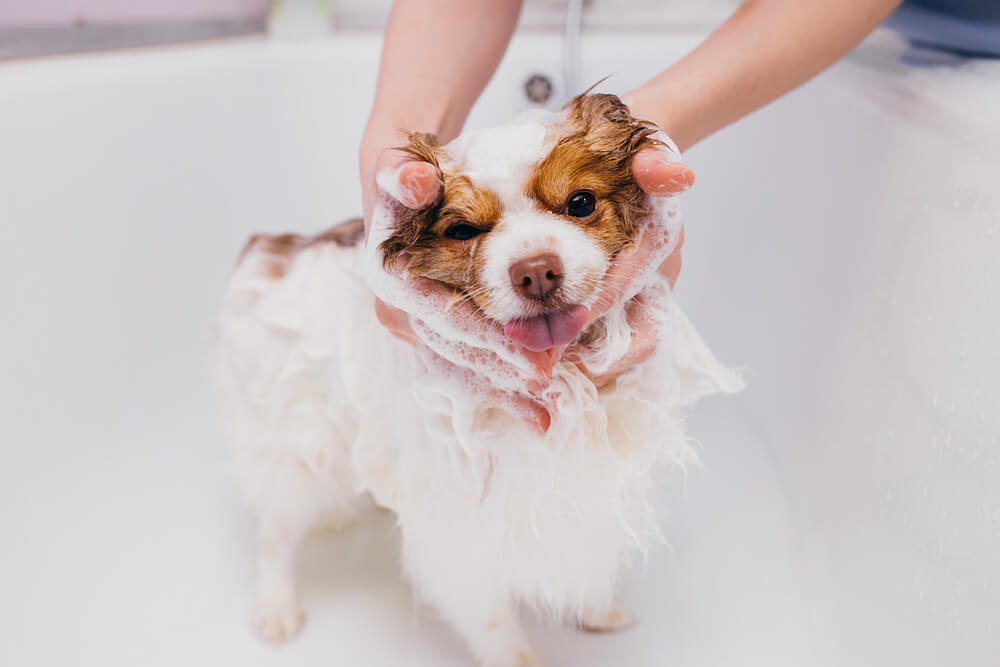
Why Flea and Tick Prevention Is Important?
Flea and tick infestations can impact the health of your pet by consistently working to prevent fleas and ticks, pet owners can help their cats and dogs avoid discomfort, skin infections, and diseases like Lyme disease and Rocky Mountain Spotted Fever.
Not only does flea and tick prevention work to keep your pets happy and healthy, but these preventative measures also help keep your home and family safe from flea or tick infestation.
There are a variety of different options for preventing fleas and ticks.
These can include oral medications, spot treatments, and sprays.
The best way to determine which flea and tick prevention option is right for your pet is to consult your veterinarian.
Based on your pet’s medical history and current circumstances, your vet will recommend the best preventative care for your animal.
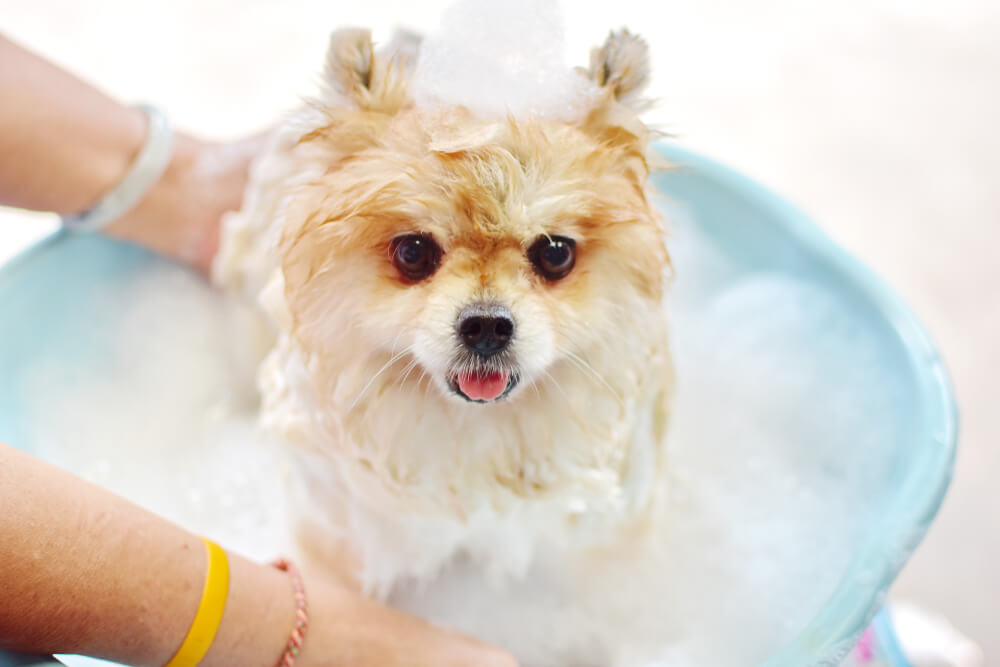
How to Prevent Flea and Tick Infestations?
Once your puppy is old enough, it’s important to start using a monthly flea and tick preventive medication to help ensure that your dog won’t be affected by fleas or ticks in the future.
Many of the treatments available and are effective for preventing both fleas and ticks.
Talk to your veterinarian about the best medication for your dog based on your location, the age and weight of your pet, and more.
Your dog is both the home and food source for fleas and ticks.
Once a flea gets on your dog, it will remain there until it is killed by a flea product or dies naturally.
Just like the adult flea, the adult tick will remain on your dog and eventually produce eggs while feeding on your dog.
Ticks, however, go through various life stages.
Ticks will leave the host and “moult” from one stage to the next.
Ticks transmit most diseases to dogs and humans in the nymph and adult stages.
If your dog is not on a preventative or adulticide (product to kill fleas and ticks), it is possible for the dog and possibly your home to develop a serious infestation within just a few short weeks.
If not prevented or treated, fleas and ticks can cause a variety of potential health issues for dogs, including:
- Skin irritation and infection
- Rashes and red inflamed skin
- Scabs and scales
- Transmission of disease and illness to you and your dog
- Psychological issues from constant scratching
Fleas and ticks can also result in the transmission of disease to humans through petting and sharing a living space with a host dog.
This is why it is critical that you are aware of the health dangers that fleas and ticks can pose.
It is important that you take measures to reduce the risk of an infestation.
With the right plan and products, flea and tick infestation is easily preventable.
Our veterinarians are here to help you develop a flea and tick prevention program that will best suit your needs and lifestyle.
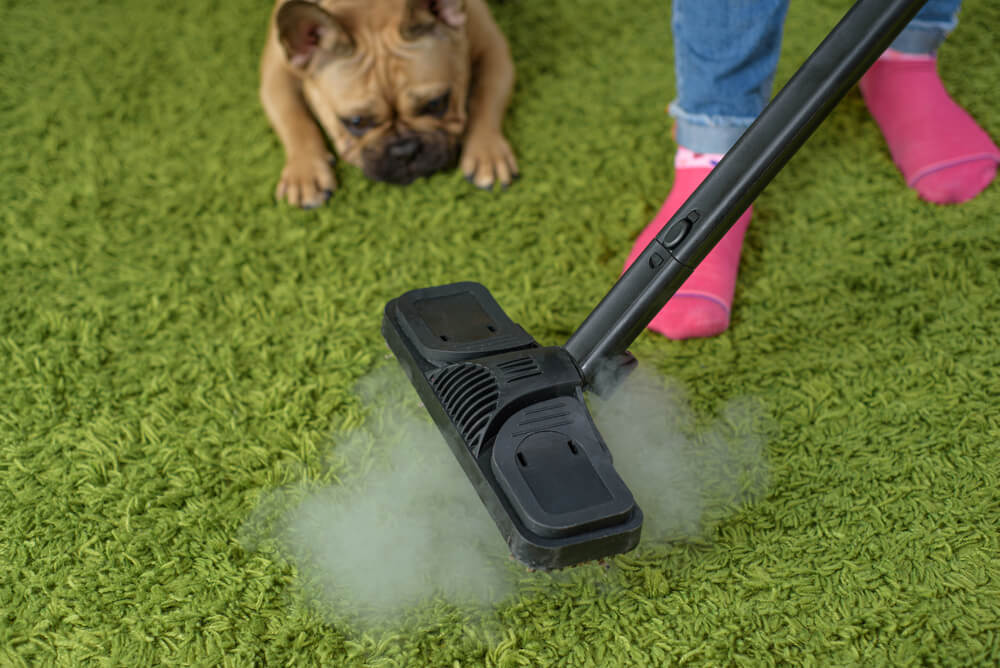
Getting Rid of Fleas in Your Home
Fleas only live on their host 5 percent of the time.
The rest of the time they’re making their home in your carpets and couches.
Treating the puppies without treating the environment is futile.
The need for aggressive environmental controls may be only temporary, though, as your pup matures, you can consider using more powerful flea preventive medications that can do an excellent job of preventing infestations all on their own.
Herbal sprays like lavender, eucalyptus, and tea tree oil can help repel fleas from your home.
Just make sure the spray is formulated and properly diluted for use around young animals.
Other natural products include food-grade diatomaceous earth, a natural pest control powder, and beneficial nematodes, which kill fleas and their larvae.
Give your house a good cleaning to remove any eggs or larvae embedded in your carpet, rugs, and furniture.
Vacuum all floors and furniture that have upholstery or padding, he adds, and throw the vacuum bag out immediately.
Don’t forget to wash your bedding, as well as your puppy’s bedding, in hot, soapy water to make sure all flea larvae and eggs are wiped out.
It can also be helpful to treat your yard for fleas to prevent future infestations.



